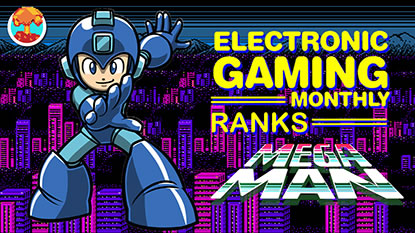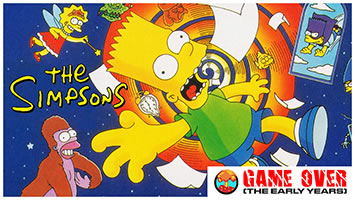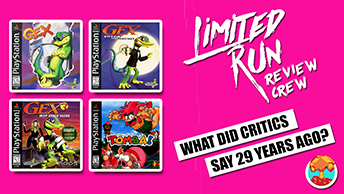- CLASSIC MAGAZINES
- REVIEW CREW
A show recapping what critics thought back
when classic games first came out! - NEXT GENERATION'S BEST & WORST
From the worst 1-star reviews to the best
5-stars can offer, this is Next Generation! - NINTENDO POWER (ARCHIVE)
Experience a variety of shows looking at the
often baffling history of Nintendo Power! - MAGAZINE RETROSPECTIVE
We're looking at the absolutely true history of
some of the most iconic game magazines ever! - SUPER PLAY'S TOP 600
The longest and most ambitious Super NES
countdown on the internet! - THEY SAID WHAT?
Debunking predictions and gossip found
in classic video game magazines! - NEXT GENERATION UNCOVERED
Cyril is back in this spin-off series, featuring the
cover critic review the art of Next Generation! - HARDCORE GAMER MAGAZING (PDF ISSUES)
Download all 36 issues of Hardcore Gamer
Magazine and relive the fun in PDF form!
- REVIEW CREW
- ELECTRONIC GAMING MONTHLY
- ELECTRONIC GAMING MONTHLY RANKS
From Mario to Sonic to Street Fighter, EGM
ranks classic game franchises and consoles! - ELECTRONIC GAMING MONTHLY BEST & WORST
Counting down EGM’s best and worst reviews
going year by year, from 1989 – 2009! - ELECTRONIC GAMING BEST & WORST AWARDS
11-part video series chronicling the ups and
downs of EGM’s Best & Worst Awards!
- ELECTRONIC GAMING MONTHLY RANKS
- GAME HISTORY
- GAME OVER: STORY BREAKDOWNS
Long-running series breaking down game
stories and analyzing their endings! - A BRIEF HISTORY OF GAMING w/ [NAME HERE]
Real history presented in a fun and pithy
format from a variety of game historians! - THE BLACK SHEEP
A series looking back at the black sheep
entries in popular game franchises! - INSTANT EXPERT
Everything you could possibly want to know
about a wide variety of gaming topics! - FREEZE FRAME
When something familiar happens in the games
industry, we're there to take a picture! - I'VE GOT YOUR NUMBER
Learn real video game history through a series
of number-themed episodes, starting at zero! - GREAT MOMENTS IN BAD ACTING
A joyous celebration of some of gaming's
absolute worst voice acting!
- GAME OVER: STORY BREAKDOWNS
- POPULAR SHOWS
- DG NEWS w/ LORNE RISELEY
Newsman Lorne Riseley hosts a regular
series looking at the hottest gaming news! - REVIEW REWIND
Cyril replays a game he reviewed 10+ years
ago to see if he got it right or wrong! - ON-RUNNING FEUDS
Defunct Games' longest-running show, with
editorials, observations and other fun oddities! - DEFUNCT GAMES QUIZ (ARCHIVE)
From online quizzes to game shows, we're
putting your video game knowledge to the test!- QUIZ: ONLINE PASS
Take a weekly quiz to see how well you know
the news and current gaming events! - QUIZ: KNOW THE GAME
One-on-one quiz show where contestants
find out if they actually know classic games! - QUIZ: THE LEADERBOARD
Can you guess the game based on the classic
review? Find out with The Leaderboard!
- QUIZ: ONLINE PASS
- DEFUNCT GAMES VS.
Cyril and the Defunct Games staff isn't afraid
to choose their favorite games and more! - CYRIL READS WORLDS OF POWER
Defunct Games recreates classic game
novelizations through the audio book format!
- DG NEWS w/ LORNE RISELEY
- COMEDY
- GAME EXPECTANCY
How long will your favorite hero live? We crunch
the numbers in this series about dying! - VIDEO GAME ADVICE
Famous game characters answer real personal
advice questions with a humorous slant! - FAKE GAMES: GUERILLA SCRAPBOOK
A long-running series about fake games and
the people who love them (covers included)! - WORST GAME EVER
A contest that attempts to create the worst
video game ever made, complete with covers! - LEVEL 1 STORIES
Literature based on the first stages of some
of your favorite classic video games! - THE COVER CRITIC
One of Defunct Games' earliest shows, Cover
Critic digs up some of the worst box art ever! - COMMERCIAL BREAK
Take a trip through some of the best and
worst video game advertisements of all time! - COMIC BOOK MODS
You've never seen comics like this before.
A curious mix of rewritten video game comics!
- GAME EXPECTANCY
- SERIES ARCHIVE
- NINTENDO SWITCH ONLINE ARCHIVE
A regularly-updated list of every Nintendo
Switch Online release, plus links to review! - PLAYSTATION PLUS CLASSIC ARCHIVE
A comprehensive list of every PlayStation
Plus classic release, including links! - RETRO-BIT PUBLISHING ARCHIVE
A regularly-updated list of every Retro-Bit
game released! - REVIEW MARATHONS w/ ADAM WALLACE
Join critic Adam Wallace as he takes us on a
classic review marathon with different themes!- DEFUNCT GAMES GOLF CLUB
Adam Wallace takes to the links to slice his way
through 72 classic golf game reviews! - 007 IN PIXELS
Adam Wallace takes on the world's greatest spy
as he reviews 15 weeks of James Bond games! - A SALUTE TO VAMPIRES
Adam Wallace is sinking his teeth into a series
covering Castlevania, BloodRayne and more! - CAPCOM'S CURSE
Adam Wallace is celebrating 13 days of Halloween
with a line-up of Capcom's scariest games! - THE FALL OF SUPERMAN
Adam Wallace is a man of steel for playing
some of the absolute worst Superman games! - THE 31 GAMES OF HALLOWEEN
Adam Wallace spends every day of October afraid
as he reviews some of the scariest games ever! - 12 WEEKS OF STAR TREK
Adam Wallace boldly goes where no critic has
gone before in this Star Trek marathon!
- DEFUNCT GAMES GOLF CLUB
- DAYS OF CHRISTMAS (ARCHIVE)
Annual holiday series with themed-episodes
that date all the way back to 2001!- 2015: 30 Ridiculous Retro Rumors
- 2014: 29 Magazines of Christmas
- 2013: 29 Questionable Power-Ups of Christmas
- 2012: 34 Theme Songs of Christmas
- 2011: 32 Game Endings of Christmas
- 2010: 31 Bonus Levels of Christmas
- 2009: 30 Genres of Christmas
- 2008: 29 Controls of Christmas
- 2007: 34 Cliches of Christmas
- 2006: 33 Consoles of Christmas
- 2005: 32 Articles of Christmas
- 2004: 31 Websites of Christmas
- 2003: 29 Issues of Christmas
- 2002: 28 Years of Christmas
- 2001: 33 Days of Christmas
- NINTENDO SWITCH ONLINE ARCHIVE
- REVIEW ARCHIVE
- FULL ARCHIVE
Is Our Industry Broken Beyond Repair?

Hey you video game companies, do you really want to make this giant line of game fans angry?
Have you ever reserved a game that you've been looking forward to only to show up and discover that there are no more copies waiting for you? Have you ever saved up all of your money for the latest and greatest next generation console only to be turned away because somebody didn't manufacture enough units? Have you ever tried to get your friends into an upcoming game only to be stumped when they ask you when it's coming out?

Even if you have the $600 to spend, chances are you won't be able to get your hands on the PS3 this Christmas!
With just months to go before the PlayStation 3's official launch, Sony made a

Ask Tyler, there is no reason to fight over a PS3!
And it's not just Sony, last year Microsoft had exactly the same problem. When the Xbox 360 launched last November there were fist fights outside of Best Buy, hundreds of systems

I would say that the Japanese really know how to sell the Xbox 360 ... but that would be a lie!
It's not like any of this should come as a surprise, we've been dealing with system shortages since the PlayStation 2 launched six years ago. Console manufacturers know that they have a short window between when they announce the console and when they can piece together the systems, yet we are
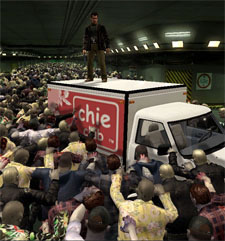
Who knew there would be so many people excited about killing zombies? Well, everybody! There's no excuse for stores to run out of Dead Rising!
Unfortunately it's not just the hardware. When it comes to finding that game you've been waiting for it can be something of a crap-shoot. Unless the game you're waiting for is the next Halo or Grand Theft Auto sequel, you never know if your favorite video game store will have any copies left. Even if you reserve the game that doesn't always mean you'll find one when

Who can forget the never-ending delays surrounding Dead or Alive 4?
Is there a reason they can't manufacture enough copies so that everybody that wants a game can buy one? It's one thing to be surprised by the success of a niche title (such as Katamari Damacy), but when it comes to something like Prey or Dead Rising there is no reason that game stores should run out half way through the first day. For an industry as large as ours we shouldn't have to cross our fingers and hope the local GameStop got enough copies LocoRoco to satisfy all of the PSP owners in the area.
And in case you haven't noticed, keeping up with the latest release dates is enough to drive anybody away from video gaming all together. Nailing down a specific release date is a tricky task that even the professionals have trouble with. It doesn't help that the video game industry doesn't have a day dedicated to their releases; instead we get release dates that feel very random. And

If you ask David Jaffe, sites like Defunct Games can't say that we are part of the video game industry. It's his industry, not ours!
Even video game advertising fails to tell you when a game is coming out. Internet adverts rarely tell you a specific date; instead they opt to give you a vague "coming soon" or "October 2006" release date. If the video game companies aren't willing to tell us when their games are coming out then why should we bother being excited for them? Is it too much to ask for some clarity in the release dates? Wouldn't it be a better business practice to tell people when the games are coming out? That way we can plan, be ready and head to the store early so that we are actually guaranteed a copy of the game.
This is certainly not how fans of other industries are treated. When you go to buy a DVD or compact disc you know exactly what day it will come out (Tuesday) and

Rockstar Games has the right idea, they are putting the release dates right in their advertisements!
If you look back at the biggest games of the past few years you'll notice that almost every one of them had some sort of release date advertised weeks in advance. Everybody knew that Halo 2 was coming out on November 9th, and October 26 was the day that millions of Grand Theft Auto fans had a chance to wreak havoc in San Andreas. More recently Electronic Arts made sure to put Madden's release date (August 22) into both print ads and television commercials. These three companies know from first hand experience how important it is to set a release date, stick to it and then advertise it. If you aren't
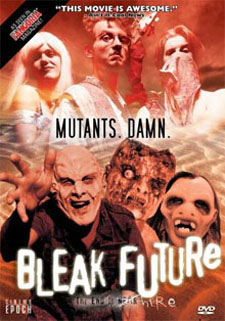
Why is it that I know exactly when the Bleak Future DVD is coming out, yet I still don't know if Warhawk will be a PS3 launch title?
It would be easier on everybody involved if the video game industry could just come together and find a single day each week when all games would be released. You see this with music, movies and DVDs already ... and it certainly seems to be working for them. Just imagine how much easier it would be to know that the game you've been waiting for will be on store shelves on Wednesday (for example), there would be no guess work or any confusion over the difference between a street date and a ship date. You would know that every Wednesday you could go into your local game store and browse their aisles to find the newest games.
And a single-day release wouldn't only be convenient for us consumers; it

I'm sure it'll be months before we know when Halo 3 comes out, but at least we'll know the exact day!
The things that gamers demand aren't that difficult to provide. We aren't asking for $20 games that pack a thousand hours of game play, we aren't complaining about sequels and rip-offs. Instead we just want the industry to care about us as much as we care about it. We want them to let us know when their games are coming out. We want them to make enough consoles so that we don't have to fight somebody to the death in order to play the newest Tony Hawk game. We don't want to reserve a game months ahead of time only to find out that the store got five copies for ten people. If this is the biggest entertainment industry in the world, then maybe it's time somebody takes it seriously and starts treating us with the respect we deserve.
HOME |
CONTACT |
NOW HIRING |
WHAT IS DEFUNCT GAMES? |
NINTENDO SWITCH ONLINE |
RETRO-BIT PUBLISHING
Retro-Bit |
Switch Planet |
The Halcyon Show |
Same Name, Different Game |
Dragnix |
Press the Buttons
Game Zone Online | Hardcore Gamer | The Dreamcast Junkyard | Video Game Blogger
Dr Strife | Games For Lunch | Mondo Cool Cast | Boxed Pixels | Sega CD Universe | Gaming Trend
Game Zone Online | Hardcore Gamer | The Dreamcast Junkyard | Video Game Blogger
Dr Strife | Games For Lunch | Mondo Cool Cast | Boxed Pixels | Sega CD Universe | Gaming Trend
Copyright © 2001-2025 Defunct Games
All rights reserved. All trademarks are properties of their respective owners.
All rights reserved. All trademarks are properties of their respective owners.













